Learn about cultural customs: Studying traditional customs in the areas where your ancestors lived can provide clues into their potential heritage or connections with indigenous people in the area at the time they lived there.
It's possible to uncover whether or not you have Native American ancestry! There are a few things you can do to find out. Firstly, (it's important) to learn about the cultural customs of your ancestors' home regions. By doing this, it might be possible to discover connections with indigenous peoples who were living in those areas at the time they did. Secondly, you'll want to look for records and documents that could shed light on their heritage. These may include census data and birth certificates, among other things! Finally, DNA testing is another option that can help determine if there are any native roots in your family tree.
It's also wise to remember though: uncovering your past isn't always easy! It takes patience and dedication; don't expect quick results. Furthermore, some records may be hard to find or even lost due to events like natural disasters or wars. Plus, it can be difficult to trace back far enough into history without help from an expert genealogist or researcher. So keep this in mind as well when exploring your background!
Nevertheless, with a little effort and determination, you can gain insight into your potential native American heritage - maybe even uncover some exciting secrets along the way! Whether it's through researching traditional customs or examining historical documents - good luck on your quest!
Use online resources: There are various online sources available that provide detailed information about both individuals and communities with Native American roots so be sure to explore these options as well!
Are you curious about your family history and wondering if you have Native American ancestry? It's not an uncommon question, as many of us want to learn more about our heritage and discover our roots! Although the answer may be difficult to find, there are a few ways you can begin to uncover the truth.
One great starting point is to look into the records and documents that are available online. There are various resources that provide detailed information about both individuals and communities with Native American roots - so be sure to explore these options too! Ask around your family members as well - they may know more than you think. You could even try talking with elders in your community who might have knowledge of local tribal customs or stories handed down from previous generations.
In addition, there are plenty of DNA tests that you can take which can help determine whether or not you have any ancestral ties to Native Americans. While these aren't always 100% accurate, they're certainly a useful tool for discovering where your ancestors may have come from. (Just make sure you do some research before signing up for one!)
Finally, it's important to remember that no matter what your results say, having Native American ancestry doesn't define who you are as a person - nor does it mean that you should use it as an excuse to "claim" someone else's culture without understanding its history or significance. Instead, take this opportunity as a way to learn more about yourself and embrace all aspects of your identity!
No matter how hard it might seem at times, never give up on finding out more about yourself and exploring where you come from - after all, knowing who we are is essential in feeling connected with the world around us! And if all else fails: keep searching; keep learning; keep asking questions until you finally get the answers that satisfy your curiosity. With enough effort and determination – anything is possible!. Exclamation!
